Government (Accidentally) Seizes Schmancy Websites!
Government (Accidentally) Seizes Schmancy Websites!

First they came for the hip hop websites, when Homeland Security seized the servers of popular websites OnSmash and RapGodfathers, due to “copyright” claims. But though that was a huge deal, the WHITE MEDIA couldn’t sustain much interest or outrage. Now the government has come for the white people Internet, so attention will be paid! Last night, the FBI raided a data center that included hosting for Curbed, Eater and Instapaper, all of which cater to the iPhone and garlic scapes set, allegedly and supposedly in an attempt to grab info on some servers used by LulzSec, the “computer hacker group” who recently messed with PBS and Sony Playstation.
SO NOW THE STRUGGLE HAS COME HOME… TO THE LOWER EAST SIDE.
Upside: if any luxury brands would like to salvage some impressions of high-end inventory while Curbed is offline, do inquire within! Boom!
Please Bring Back "Jurassic Fight Club"!
by Becky Ferreira

“Jurassic Fight Club” was a one-season series on the History Channel, and I am a dedicated fan. I’d bet I’m one of about six people in the world who can claim this, and I am definitely the only one with a full set of adult teeth. I consumed all twelve gripping episodes. I follow the host, “Dinosaur George” Blasing on Twitter, and I hold the high score in their online game Turf Wars. I also hold the #2, #5 and #9 spots, presumably because I’ve been competing against four-year-olds.
Part of the allure of “Jurassic Fight Club” derives from the History Channel’s general brand of madness. I love history as much as the next dweeb, but it’s clear whoever is pulling the strings at this A & E offshoot either a) doesn’t like history and has an evil plan to torture it forever or b) has no clue what history actually is, and has been coasting by on insane amounts of charm. We’re talking about a channel with a whole series called “Ancient Aliens,” which is exactly what it sounds like. Don’t get me wrong; if there were real evidence that aliens had visited us in a more primitive era, I would definitely watch a show devoted to it. But the talking head experts this show features are the brand of lunatic that can’t keep both their eyeballs from rolling about disconcertingly in their skulls. You know those rumors about mole people living in the NYC subway system? Pretty sure they earn an extra dime by surfacing and appearing on “Ancient Aliens” to talk about how King Tutankhamun definitely invented the lightbulb… using alien technology. “Jurassic Fight Club” was developed with this characteristic maniacal bent.
Never mind that airing a show set during the Mesozoic already constitutes a pretty liberal interpretation of “history.” Never mind that the Palahniuk title reference conjures up images of overworked, corporate dinosaurs getting back to their apparently distant animalistic roots in dark basements. There are bigger plesiosaurs to fry, such as “Dinosaur George” himself.
Dinosaur George is a very strange specimen of a paleontologist. He is ubiquitous in dinosaur-related shows. Yet he is entirely self-taught. No paleontology degrees, no formal training: the guy just loves dinosaurs and has made a career out of enthusiastically talking about them. So instead of “Dr. George” Blasing, which he can’t use, he has invented the much more awesome title “Dinosaur.”
This is usually the part where I might try to bash him for being an imposter in his field, but a) he’s totally great and I love him, and b) as if I’m in some weird “Dexter” scenario, I have to recognize that he is just like me. If I call him out, I have to call myself out too. I am so obsessed with dinosaurs, it’s pretty much the upshot to my entire personality. But I am also not formally trained as a paleontologist. I’m not out there using toothbrushes to clean out fossilized eye sockets. I don’t even know if they use toothbrushes for that! I’m not even enough of a dilettante to devote my whole life to teaching others the way Dinosaur George has. So really, what I’m saying is that part of my love for “Jurassic Fight Club” comes from a weird rivalry with the host. He is unaware of this rivalry, but he has every right to be really creeped out by it if he ever discovers it. Which, if he has a Google alert on his own name, he now will.
More importantly, I am a fan of “JFC” because it both repulses and attracts me. The show takes a forensic bent, describing every fossil site as a “crime scene.” That’s hilarious, and makes me picture a T-Rex in teensy li’l handcuffs after his inevitable conviction, but it also makes me angry. You can see how the experts are being coerced into blurting out things they wouldn’t normally claim, in a desperate attempt to make their findings sound more exciting. The general construction of these statements goes as follows:
Paleontologist: Well, I suppose in certain circumstances, this [insert near impossible thing] could have happened, but —
Narrator: This [insert near impossible thing] did happen, and it looked like this! [Slow motion computer-generated shot of near impossible thing.]
The whole premise implies that dinosaurs on their own aren’t interesting enough, so we have to add a “CSI” angle. Seriously? Dinosaurs were enormous monsters that were ultimately brought down by a giant space rock. That’s not epic enough for you, world? You need a narrative other than the Monster versus Comet story? You disgust me with your largesse.
On the other hand, the show attracts me because it’s about dinosaurs. And I love them. So, they’ve really got their hooks in my antorbital fenestra here.
It evens out that I want the show back, and I hope that this extremely detailed review of one of my favorite episodes will convince the History Channel that a new season would have at least one viewer in me. And one viewer is honestly a pretty good count for the ol’ HC. I think “American Pickers” averaged about 140 viewers an episode because so many people died of shame for having witnessed it. (Nielsen counts ghost viewers as negatives, FYI.). So consider this review my pledge of allegiance to all things “JFC,” come what may.
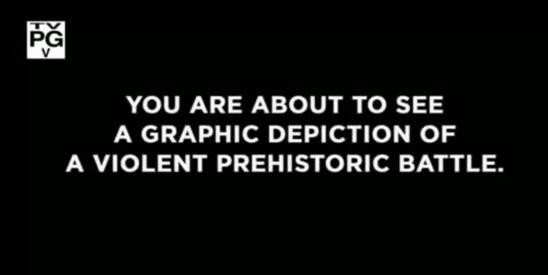
EXHIBIT A: Episode 8, “Raptor’s Last Stand”
Tagline: You know, like General Custer’s Last Stand. But with a raptor.
Battlers: GASTONIA versus UTAHRAPTOR.
Stakes: Life & death; survival in the prehistoric world.
Quotes describing GASTONIA

• “Its tail worked like a chainsaw.”
• “A giant porcupine-like monster previously unknown to science.”
• “Built like a Sherman tank.”
• “This was a walking armored pincushion.”
• “This animal was built like a Sherman tank.” (build = Sherman tank, pt 2).
• “Now, remember, Gastonia’s tail is like a chainsaw.” (tail = chainsaw, pt. 2).
PERSONAL FAVORITE: “I tend to liken the tail of Gastonia to a chainsaw.” (tail = chainsaw, pt 3).
Quotes describing UTAHRAPTOR

• “What kind of monster would be able to be smart enough and fast enough to attack the Gastonia where it counted?” (Utahraptor; implied)
• “This was a giant super-sized raptor.”
• “They named this beast ‘Utahraptor’, meaning ‘thief of Utah.’”
• “Utahraptor was the Velociraptor on steroids. This is the punked-up raptor.”
• “That’s why it was given the nickname ‘Superslasher.’”
• “We also call it ‘Killer Claw.’”
• “If I was going to build the perfect raptor, I would build a Utahraptor.”
PERSONAL FAVORITE: “Don’t mess with a raptor, you’re going to lose.”
Key Pre-Fight Observations
1. The paleontologists, clearly being egged on by the producers, conceded that Gastonia might have had pterosaurs settle on its back, the way birds settle on modern day rhinos. It seemed pretty made up, but every image of the Gastonia afterwards depicted it with these weird birds riding on top of it, and it was heavily implied that this was as much for companionship as it was for help sensing predators (they were frequently referred to as the Gastonia’s “entourage”). Also, these pterosaurs are obviously from the Azhdarchid family, and there’s very little evidence that they were around that early in the Cretaceous. Major flub, “JFC”! You must be so embarrassed to have all that dino-egg on your face! Oh, you’re not?
2. So, you know that speech Dr. Grant makes to the kid in Jurassic Park, about how the raptor could slash his belly open and blah, blah, blah, he hates kids but learns to love them by the end and Dr. Sattler’s like “awww” in the helicopter? They went absolutely out of their way to have their raptor descriptions resemble that speech, but they never directly said, “Like in Jurassic Park, you know?” It was pretty disingenuous. You have to admit that Jurassic Park practically invented the raptor, probably even more than the raptor invented the raptor, and definitely more than “Jurassic Fight Club” invented the raptor. And while we’re on it, the Jurassic Park raptors were 100% Utahraptors because Velociraptors were actually two feet tall and had ridiculous feathers. In order for a Velociraptor to win in a real one-on-one fight against a human, it’d have to fight a toddler. But what they do have? A frackin’ awesome name! Velociraptor! It rolls off the tongue like water droplets off Dr. Sattler’s hand. Real smart, paleontologists. Making itsy bitsy raptors sound like they were the gangstas of the Cretaceous while the genuinely frightening predators like the Utahraptor sound like boring Mormons! What was Spielberg to do?
3. Weird head-on graphic image of the raptor’s skull, in which it looked exactly like Jack Skellington. It was like they had just cut and pasted The Nightmare Before Christmas DVD cover up on there, minus the weird spiral-y Tim Burton hillock.
4. The comparison of a wolf fighting a porcupine. Just seems like a pretty different situation, and also something that would probably never occur, which actually makes it a similar situation.
5. The use of the phrase, “using as much evidence and scientific fact as possible”, which translates to “we did not use evidence or scientific fact.”
6. The phrase, used in every episode in some way or other: “Unlike modern day crime scenes, the difference here is that the dinosaur remains have been stripped of their organic material.” The first rule of “Jurassic Fight Club” is that we will refer to fossil beds as “crime scenes.” ALWAYS. Get fingerprints! Oh, fingers haven’t evolved yet? Get talon prints!
Perhaps you don’t believe me. To the video!
Fight Breakdown
The Utahraptor is starving to death. Under normal circumstances, he (all dinosaurs are generally male in the show, as opposed to the girlies of Jurassic Park) would not attack this Sherman tank with its chainsaw tail. But things have become desperate….
Meanwhile the Gastonia is using its weird sixth senses to try to find water. His “entourage” of anachronistic pterosaurs is at full alert. They sense the Utahraptor’s approach and warn the Gastonia.
The Utahraptor and the Gastonia confront each other. There is a great deal of gnashing and tail-swishing, and it is quite suspenseful.
The Utahraptor uses his superior “intellect” (it is referred to as an intellect; the raptor is an intellectual) to strategize an attack.
The enormous Gastonia is inexplicably being referred to as “the little Gastonia” by the paleontologist describing the fight. Perplexing, but kind of makes you root for the Gastonia by default.
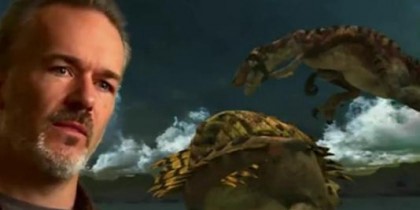
The Utahraptor decides the best strategy would be to jump over the little Gastonia. Just jump right over it. I guess he thinks this will confuse the little Gastonia? A clear answer is never quite given re: the strategy. But I will admit one thing: it did look really awesome when he did it. The music was all “dun-dun, dun-dun” and you (if you were me) were all “whoa, don’t even think of jumping over that giant spiny Sherman tank with its chainsaw tail!” and then it was all sort of slow-motion and you (if you were me) were like, “I can’t believe you’re jumping over that giant spiny Sherman tank with its chainsaw tail!”
The little Gastonia, duly confused, is caught unaware as the Utahraptor bites into his front leg. He swishes his chainsaw tail but it’s no use!
Ok, time out: quickly, let’s address the chainsaw tail. It is in no way like a chainsaw. It is not motorized nor does it have several small sharp teeth. It’s just a spiny tail. Ok, time in.
The little Gastonia is in dire straights. According to the narrator, his front leg is currently in unbearable pain. But the fight isn’t over.
Ok, time out: generally, you can tell what dinosaur will win by who wins the first battle. If they win the first battle, it’s all over for that dinosaur. So at this point, we can assume that the Utahraptor is fucked. Ok, time in.
The Utahraptor has a bold new plan of attack. He wants to go for a back leg, but, as the narrator informs us, that is exactly where the little Gastonia wants him.
The chainsaw tail is now referred to as both “the most anti-raptor weapon ever made” and as “anti-raptor scissors,” as if these spines were specifically developed for rogue hungry raptors, and would not harm other predators. I hoped they would say the phrase “raptor ready,” along the lines of “Rapture Ready,” but alas, no such luck.
Anyway, the raptor, whose last strategic attack was to jump over the spiny thing, has now decided to go near these obviously anti-raptor weapons. Well, he pays a serious price! The little Gastonia is all “Eff you!” and catches the raptor’s leg in the spines. The “shearing action” of the spines “is like a hedge-clipper,” we are told, which seems like quite a step down from a chainsaw. Is this tail a cute, socially awkward Edward Scissorhands, or are we talking about motherfrackin’ Evil Dead-style Ash? Some unholy hybrid, I guess, and the raptor is helpless in this specifically anti-raptor device. His leg gets all cut up. As predicted, it’s over for that raptor. That raptor’s got a bloody leg and he’s still starving. The little Gastonia and his entourage of anachronistic birds wander into the desert.
Weirdly though, the narrator goes on to tell us that both dinosaurs eventually die from starvation due to drought, which means that the summary of “Jurassic Fight Club”: Raptor’s Last Stand is…
WINNER: WEATHER.
That there was no second season of this show is an unholy travesty.
Previously: Humanity’s Endless Quest to Invent a Death Ray: A History
Becky Ferreira is a comedy nerd and you had better come see her in GRINDHOUSE MUSICAL next week
.
Israeli Dog Unmolested
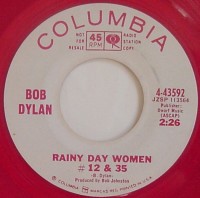
“There was no talk of reincarnation, a lawyer has never been mentioned, either now or 20 years ago, and there was no stoning. Such inventions are a kind of blood libel, and we wonder why the inventor of the story did not continue to describe how we collected the blood of the dog to make our matzah.”
— The secretariat of the Monetary Affairs Court in Jerusalem’s ultra-Orthodox Mea Shearim neighborhood released a statement denying reports in the Israeli newspaper Maariv earlier this month that a dog had been sentenced to death by stoning because plaintifs and judges thought that it was a gilgul, or the reincarnated soul, of a secular lawyer who had filed a civil suit against the court 20 years ago. Maariv has retracted the original story and apologized.
Movies Written or Directed by John Hughes, in Order
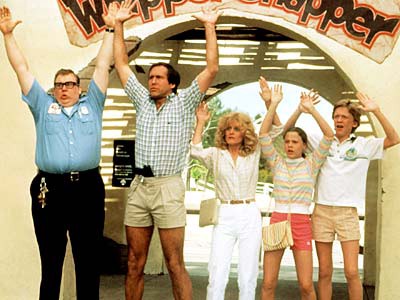
32. She’s Having a Baby
31. Mr. Mom
30. Miracle on 34th Street
29. Home Alone 3
28. Nate and Hayes
27. Reach the Rock
26. Baby’s Day Out
25. Just Visiting
24. National Lampoon’s Class Reunion
23. Beethoven
22. Drillbit Taylor
21. Flubber
20. Planes, Trains and Automobiles
19. Home Alone 2: Lost in New York
18. Dennis the Menace
17. Career Opportunities
16. Maid in Manhattan
15. Curly Sue
14. Dutch
13. 101 Dalmatians
12. The Great Outdoors
11. National Lampoon’s Christmas Vacation
10. Home Alone
9. National Lampoon’s Vacation
8. Weird Science
7. Ferris Bueller’s Day Off
6. Sixteen Candles
5. The Breakfast Club
4. National Lampoon’s European Vacation
3. Pretty in Pink
2. Uncle Buck
1. Some Kind of Wonderful
Jolie Kerr will not harm you or touch your defenses.
The Magical Place Where There Is More Bourbon Than People
Let’s go to Kentucky! “More than 5 million barrels of bourbon and other whiskeys are currently aging in the state, the highest inventory since the early 1980s. The 4.7 million barrels of aging bourbon even outnumbers the state’s population of 4.3 million.”
The "Wisconsin Freedom Phones" Call Center in the Minneapolis Hilton
by Abe Sauer

“The Wisconsin phone center is open,” said Americans for Prosperity President Tim Phillips in his opening remarks on Saturday, just before conservative speakers Michelle Malkin, Glenn Beck and Michele Bachmann addressed the attendees of the RightOnline conference. Before turning it over to the headliners, Phillips further encouraged the crowd of 1500 to “take a break during some point in the day” and “go over and look at the script, try a couple.”
Philips closed by asking everyone if they were “willing to stand with Scott Walker.”
Next to the testimony room, on the third floor of the the Minneapolis Hilton, the “Wisconsin Freedom Phones” call center operated for both days of the RightOnline conference on June 17 and 18. The script used in the for the calls consisted of only two questions. For just two questions, they said a lot.
RightOnline is a project of the Americans for Prosperity Foundation and is dedicated to “advancing liberty and prosperity for all Americans through greater citizen participation online.” Founded in 2008, RightOnline is a boot camp for training conservative activists in both Internet activism and ideology. Breakout sessions include Twitter 101, Advanced Twitter, Becoming an Effective Citizen Journalist, Protecting Yourself Online: Internet Security Issues for Activists, Legal Issues Related to Online Activism, Citizens Interacting with Congress Online, and Detecting & Countering Left-wing Media Bias (taught by ACORN-busting “pimp” videographer James O’Keefe).
The goal of the conference is, in part, to take ideological conservatives and teach them the online and social media skills they need to all become @patriotusa76, the still-mysterious Twitter user that brought down Congressman Weiner.
One training session — “Youth Outreach, Not all Students are Liberal” — taught a room of adults about how to create activists in high schools. One of its panelists was 15-year-old Tricia Willoughby; many Wisconsinites may remember Willoughby as the youth speaker at the Madison Tea Party rally who was so energetically defended by conservative blogger Ann Althouse.
So: the two questions. First, after identifying oneself as calling from Americans for Prosperity, the callers were instructed to ask: “Who do you plan to vote for in the upcoming election?”
Then, a second question: “Do you support or oppose Governor Walker’s budget repair plan which reforms the way government workers collectively bargain?”
Herbert Kritzer, the political science professor and the Marvin J. Sonosky Chair of Law and Public Policy at the University of Minnesota, says the script is “not the kind of blunt instrument one sees in many push polls.” He adds that it’s “on the margin” and “reflects a particular perspective (use of the term ‘reform’ rather than ‘limit’).”
But a straight push poll may not have been the goal of AFP’s RightOnline call center.
The AFP call center’s “Frequently Asked Questions: Wisconsin Recall Elections in 2011” document, which was given to call center volunteers, included as one of the “talking points” directions for call center operators to answer the question “Who is the Republican? Who is the Democrat?” It instructed the volunteer RightOnline callers to “go ahead and inform them… but be careful not to show any support or opposition for either Party.”
AFP is a 501(c)(3) organization, and as such, according to the IRS, is “absolutely prohibited from directly or indirectly participating in, or intervening in, any political campaign on behalf of (or in opposition to) any candidate for elective public office.” Like most tea party organizations, it bills itself as non-partisan.
Instead, the way the calls and data fields were structured, it’s more likely that what the call center was meaning to do was to confuse voters about the candidates in the upcoming recall elections.
One of the call center administrators allowed me to sit down and look at the program used. The drop down input for the first general question, about which candidate the voter would choose, included both the recalled Republican, the Democrat challenger and the “spoiler” Democrat placed to force a primary election. So, for example, those making calls to District 32 around La Crosse were told to inform voters that their choices in the upcoming election included (incumbent) Republican Dan Kapanke, Democrat Jennifer Shilling or Democrat James Smith. (James Smith is a former Republican official now running as a Democrat to force an unnecessary Democratic primary.)
Of the questions asking which candidate the voter would choose, nothing was noted to differentiate primaries from general elections. Volunteers made no distinction between the July primaries and the August general elections, yet at the same time read off the names off candidates from both parties.
Asked about Americans for Prosperity, a spokesman for Wisconsin’s Government Accountability Board told us that it is GAB policy not to comment on any complaints it receives.
The call center was not the only Wisconsin recall-focused initiative at RightOnline. One session was titled “States in Fiscal Crisis: Reforming State Collective Bargaining.”
A special session Friday afternoon titled “WI Brainstorming Session with State Director Matt Seaholm” featured the AFP Wisconsin head stressing to the audience that winning the recall elections was paramount, because if the Democrats win, “they will smell blood” and immediately go after Governor Walker. Seaholm said that if “the conservative majority remains intact” after the recalls, “it’s going to be tough for them to take that lack of momentum and restart an effort to get 500,000 signatures.”
(If anyone is smelling blood, it’s Seaholm. That same day, The Progressive published a piece of disgusted barf in which its editor Matthew Rothschild wrote, “The mass protests that I expected this week at the capitol in Madison did not materialize. On Tuesday, there were maybe 5,000 people there. On Thursday, barely 1,000. I’m sorry, but that was pathetic.”)
* * *
“As more and more protesters come in from Nevada, Chicago and elsewhere, I am not going to allow their voices to overwhelm the voices of the millions of taxpayers from across the state who think we’re doing the right thing.”
Those words from Gov. Scott Walker, spoken in February, were just the beginning of a campaign to pin the protests and outrage over the budget bill on out-of-state influence. In the months since, Walker has continued to bang this gong. He went on Fox News to warn outside agitators to “stay out of the state’s business” and he has regularly used his Scott Walker Twitter account (not the Governor’s account) to lambaste the out-of-state “union bosses” trying to influence the recall elections.
American for Prosperity was a huge supporter of Walker’s campaign, as well as highly active during his original budget proposal. They ran a “Stand with Walker” campaign, and sent pro-Walker protesters to the Capitol for tea party counter rallies.
Later in the afternoon on Saturday, just before Tim Pawlenty took the stage to recite an anecdote about his family’s trip to Wisconsin Dells, who was in the call center working the phones but the entire Willoughby family, including now-15-year-old Tricia.
At least she’s from Wisconsin.
Abe Sauer’s full report on RightOnline’s Internet boot camp is at Esquire. He can be reached at abesauer at gmail dot com.
La Toya Jackson's Book Party
by Myles Tanzer
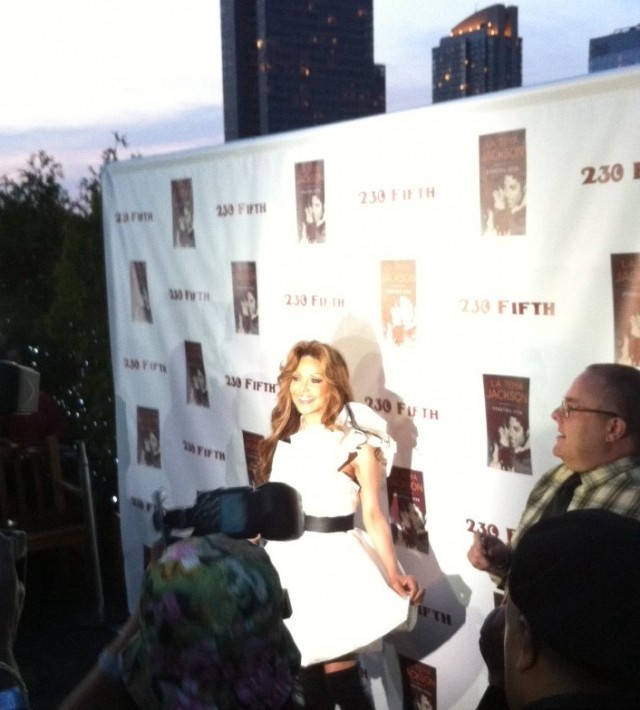
On the roofdeck at 230 Fifth Avenue last night, a man was taking pictures of La Toya Jackson with an iPad. “I saw Spike Lee take Obama’s pic with that thing!” said a photographer. Apart from press, the crowd tended towards rejected Real Housewives. (One partygoer named Cheri aspired toward both a singing career and a gay sidekick.)
“Is this the closest you’ve ever been to a Jackson?” someone asked.
“Well, my brother was in a hot tub with Michael in 1983, so that’s got to count for something,” someone else said.
La Toya entered her book party — she is the author, as of today, of Starting Over, a memoir about her life with Michael — in a one-shouldered super-ruffled white dress. She wore a quite heavy looking diamond necklace and an even more blinged-out cuff bracelet. While Latoya stood on her mini red carpet, onlookers baited her to look back at them like Roberto Benigni did in that opera scene in Life Is Beautiful.
After posing with the cover of her book for pictures, La Toya was ushered into a small VIP section. “Can someone please acknowledge like they heard me about the Cristal magnum?” an organizer screamed into a walkie-talkie. “If this is how long bottle service takes at 235 Fifth — it’s pathetic!”
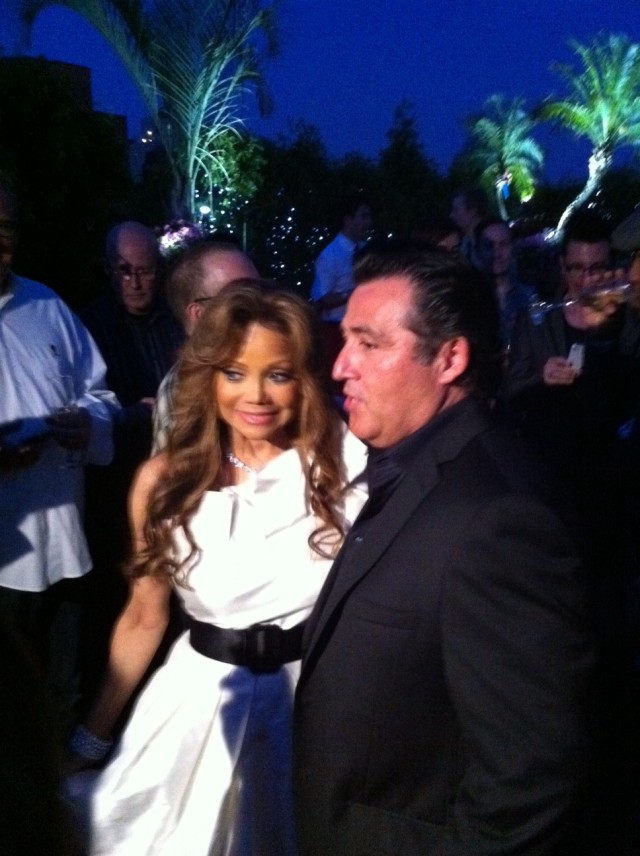
Bottles were popped; Latoya barely touched her glass, having no more than two sips. She did make sure to ask every empty-handed person around her if they wanted a glass for themselves. All of the press watched La Toya have fun with her friends from beyond. As Smash Mouth’s “Allstar” blasted, I was ushered in to discuss the book.
“I started writing it because so many women were coming up to me and wanting to know the story of being abused,” La Toya near-whispered to me. “They wanted me to tell my story and they were telling me their story. And I felt like, why not reach out?”
All of her inspiration got me very excited. “Are you the next Oprah?” I asked. She smiled politely. “Oh that’s very interesting,” she said, “but I just want to be able to reach out and help people. That’s very, very, important. If I can inspire by speaking up, by all means I’ll continue to do it.”
Nikki M. James, the very-recent “best featured actress” Tony winner from “The Book of Mormon,” arrived. Janet Jackson’s “What Have You Done For Me Lately” came on the sound system, and La Toya made a quick exit out the back.
I congratulated Nikki on her Tony win and asked why she was here. At first she just looked at me. Then she yelled: “She’s fucking incredible! She’s a woman in a man’s world. I’m a black girl and she’s a Jackson! I love her!”
Myles Tanzer would love to come to your party.
Do Not Shake Hands With British People
Couple of British fellows meet up near a shop. An altercation ensues, during which one takes a swing at the other and then flees, only to return fifteen minutes later, in a seemingly conciliatory mood. He asks the man he has recently struck to shake hands in a gesture of good will. The man agrees. You can guess what happened next.
Four Writers Tell All About Titles

The title of a book, along with maybe the cover, is most often what’s going to lead a potential reader to pick up your baby book. Which isn’t to say coming up with a good one is easy. To the contrary, it’s the sort of thing, like naming a band, that can cause everyone involved a lot of agony, particularly when an author has settled on something very early in the process and someone else (usually involved in selling it) however many months or years later decides that the book might be better served with something different.
So, how do we know if we have a good title? According to author Bennett Madison, there’s only one way: “Before you decide on your title for real, practice telling it to people at parties. If you can do it without cringing/wincing it’s the perfect title!”
Okay, now that you have your title in place (at least in from your vantage point) and your book is in production, what happens next? With a thought to find out, we asked a few authors — including Laurie Frankel, Suzanne Morrison, Richard Rushfield and Urban Waite — the following set of questions:
- Did the title of your book(s) change between selling your manuscript, submission, and publication?
- If so, who instigated the title change? Did your agent get involved at any point? Did your contract have any title provisions that came into play?
- Did you create the new title of the book or select one that was offered to you? Can you share some of the suggestions that were proposed?
- Did you “push back” in any way w/r/t the new title, and did the process cause any emotional or other trauma? (If so, did you recover?)
Let’s dive in!
Laurie Frankel
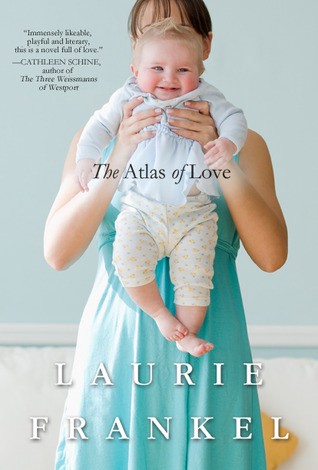
My first novel was called Naked Love. Note the use of the past tense. That said, it was called Naked Love for a really long time. I had the title first. Well, the title and the titular moment about two-thirds of the way through the book. I had it before I had an ending or even a middle or even a setup, plot, or names for the characters. I had the title before I had any idea whether or not I could write a novel. I had to rewrite the first chapter 12 times — and I’m talking wholesale rewriting, not revision; I’m talking about opening a blank document and starting from nothing — but I knew the title before I knew basically anything else.
My husband, who is a software engineer and knows nothing in particular about the book industry, often reassured me while I was writing it that, though I knew no one and nothing and had no experience or previous publications or connections or faith in myself or what I was doing, the book would find its way because the title was so salable. My wonderful agent loved the title. My wonderful editor loved the title. For months and months of revising and editing and getting to know the ins and outs of this crazy industry, the idea of changing the title never came up.
And then one day it did. My editor mentioned it late in a conference call about a thousand other things. She said she was in an editorial meeting and someone had suggested a title change. They didn’t say to what or why, and she hesitated even to mention it so certain was she that nothing would come of it. My agent said, “No! Are they [expletive] [expletive]ing me?!” My editor said not to worry about it.
Then a few weeks later, she said to worry about it. It comes up again and again at meetings, she said. Naked Love sounds too generic, too nondescript, too much like soft-porn, too much like Naked Lunch. They wanted to call it Raising Atlas after the baby in the book whose name is Atlas. I said if Naked Love sounds too much like Naked Lunch, doesn’t Raising Atlas sound too much like Raising Arizona? I submitted a couple dozen titles with the name Atlas in them that I felt like I could live with. My editor reported back: “They didn’t like them.” “Any of them?” I asked. “Nope,” she said.
One morning she emailed me and my agent, “They like The Atlas of Love. What do you think?” My agent wrote back, “Are you kidding? That’s the title!” All the folks in her office loved it. All the folks in-house at the publisher loved it. Me? I was sleeping. This was happening first thing in the morning in New York. It was 5:30 a.m. in Seattle. By the time I got up, I had a flurry of emails from people cc:ing me but responding to each other about how much they loved this new title. So what could I do? Learn to love it too.
Learning to love it too has been something of a battle for me. I’m new to this game, so I can’t give advice; I can only explain how I learned to stop worrying and love the title. My agent, who knows much more about writing and selling books than I do, loved it. My publisher, who knows much more about writing and selling books than I do, loved it. My editor, who had been as attached to Naked Love and its titular moment as I was, loved the new title. And I figured they knew. And I figured I should be conciliatory and flexible and trusting and full of faith because, as I say, I’m new to this game. Meanwhile, at work on novel number two, I have a working title I refuse to get emotionally attached to. And this niggling reminder I learned in kindergarten and have clung to ever since: it’s what’s inside that counts.
Laurie Frankel is the author of The Atlas of Love. She lives in Seattle where she is at work on novel number two.
Next: Suzanne Morrison on remaining a Yoga Bitch.
Suzanne Morrison
It took almost losing my title to convince me of its value. Yoga Bitch had its start as a one-woman show I developed with my director, Jean-Michele Gregory, in New York. Jean Michele and her husband, the uber-monologist Mike Daisey, spent many hours with me debating titles for the piece. It was a group effort. All I knew was that I wanted a title that would capture the conflict between the sacred and the profane, and the way in which the search for my higher self brought me into direct contact with my lower self. In fact, that was the working title for the show: The Lower Self.
The Lower Self was problematic. First off, it suggested that the piece was about my lower body. My below-the-belt region. But while that region is certainly represented in the story, by way of piss-drinking yogis and mulabandas and hot-for-teacher dreams, my netherparts aren’t exactly the point of the story, not exactly title-worthy. The other issue was that people kept asking if my story had anything to do with Gorky’s The Lower Depths. It required explanation. We shrugged our shoulders and kept working.
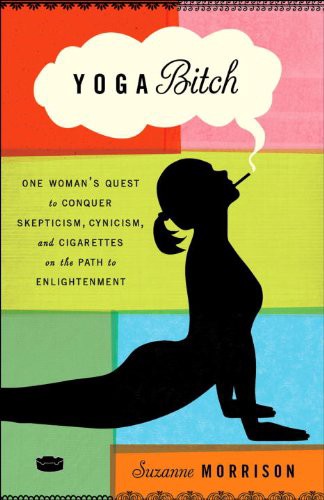
A few months into the process, Mike was scheduled to go in for oral surgery. Jean-Michele sat with him as the anesthesiologist prepared him to be put under. Mike’s eyes got droopy, but then they popped open. “Suzanne should call her story Yoga Bitch,” he said. And then he passed out. Jean-Michele arrived the next evening for our meeting in an ebullient mood, and presented the title to me as a glorious gift. I found it absolutely horrifying. It was so brazen, so bold, so perfect. I hated it, the way we hate fate, or a photograph that reveals too much about how we really look. There was simply no other title. This title ate all the other titles we had bandied about for breakfast.
A million years later, I sold Yoga Bitch to my publisher and was in the middle of the final round of revisions when I received an email from my editor. She had been in conversations with the marketing folks and everyone was a little concerned about my title. Not because of the profanity, but because the title might mislead readers into thinking the story was more biting or sarcastic than it is. That they would come prepared for a brassy, “fuck yoga!” kind of book, and be disappointed when they discovered that I actually take my subject seriously, if irreverently. She said they’d been batting around a few ideas, and the alternative title they’d come up with was The Yoga Diaries.
A lot of writers think their editors are crazy when they try and change their titles, but I didn’t. I knew exactly what she was talking about, because I had been worrying about the same thing. In writing the story as a book, deeper themes emerged that hadn’t been present in the play; fear of death, yearning for faith, the hunt for something real. I was as worried as my editor that these more earnest aspects of the book would confuse or disappoint readers looking for a light, edgy, sardonic tale. I imagined a woman in skinny jeans and halter top reading about my secret yearning for God and faith and throwing the book underfoot to poke holes in its cover with her stiletto heels: I was promised bitchy! This isn’t bitchy!
I told my editor I’d think about it, and she gave me the week to get back to her with my answer. And then I wrote up my immediate reactions.
What I liked about trading out Yoga Bitch: 1) I liked that it separated the play from the book, because they were different; I agreed with my editor that I didn’t want folks to pick up my book expecting Skinny Bitch on a yoga retreat (see above fantasy re: stiletto holes); 3) I worried that, if my book was successful, I would always be That Yoga Bitch.
What I didn’t like about changing the title: 1) Yoga Bitch is instantly eye-catching. It gets an immediate response (usually laughter, then curiosity) and people remember it, both of which are hugely important; 2) the title Yoga Bitch had taken me a long way from a basement theater in New York to London and back again; there was a strong online presence for the title, and I often heard from people who were already familiar with it; 3) there were times during the writing of the book when, in spite of all my fears, I felt that the title said something like, “This book is funny and occasionally vulgar, but ultimately it deals with a subject matter I take seriously.”
My ambivalence thus recorded, I started polling everyone I knew. Nobody liked The Yoga Diaries. Well, one friend loved it, but she’s never liked Yoga Bitch, so she probably would have liked any alternative title. She would have liked Yoga Book. My husband suggested Mein Kampf… mit Yoga. My aunt offered Three Cups of Pee. One cousin noted that The Yoga Diaries would play better in conservative cities like Spokane. But I didn’t write the book for conservatives in Spokane, so that didn’t convince me. My mother came up with the title Doggie Style: How I Did Yoga. Oh, wait, no. That was me. Or wait, no: that was the alcohol.
My agent’s response was succinct: No f-ing way, she said. Yoga Bitch is the gift that keeps on giving.
That week I pored over the book, looking for guidance. And to my surprise, every page told me the same thing: Yoga Bitch was the title. It was woven into every page of the book. It perfectly captured the story I was trying to tell, a story that was equal parts sacred and profane, Yoga and Bitch. Not only bitch as in bitchy, but bitch as in bitch session, as in the yoga bitches that populate every urban city, as in, “It’s a real bitch, having to convince my yogamates that I’m not going to drink my pee.” It did the very thing I set out to describe in a title: it said that when I looked for my inner yogi, I found my inner bitch. She’s not skinny, in heels, with a martini and a sour expression on her face. She’s me, just ten years younger and a little more deluded, a little caught up in the ego rush of a big yoga breakthrough, a little bit resentful of that twentieth sun salutation, a little bit in love with two men, and absolutely terrified of the future.
Once I had made up my mind, it was time to convince my editor. I’ve had a great experience with my publisher — from my editor to publicity and marketing, I’ve had nothing but support and wise counsel, so in that I consider myself extremely lucky. I wanted to make it clear that I hadn’t dismissed their idea, that I had wrestled with The Yoga Diaries and Yoga Bitch until a victor emerged. So I wrote up a proposal for why and how to keep the title as-is. I wrote up sample back-copy and included links to cover art. The most salient points were these: 1) Yoga Bitch has a perspective on the yoga story that The Yoga Diaries does not; 2) what makes the title great is the tension between the two words and that what we’d need to do is make clear in press releases and in the back copy that the book is as much Yoga as it is Bitch; 3) let’s keep Yoga Bitch, but use it in a sophisticated way. I suggested we do this through the cover design and in the back copy, by using a font and cover art that played against the “Bitch” in the title, preparing readers for the tone of the book.
My editor agreed with me at once, and she smartly suggested that we could use the subtitle to clarify these points as well. She suggested Yoga Bitch: One Woman’s Quest to Conquer Skepticism, Cynicism, and Cigarettes on the Path to Enlightenment, which I loved. And then she guided the cover design to something that is so perfect I wanted to cry when I first saw it. No stilettos, no martini glasses. I loved it.
I suppose if I were to have any advice to writers starting out, it would be to work with your editor. Give her the benefit of the doubt; a good editor knows what she’s doing. But you know your story and it’s your name on the cover of the book. So whether you’re ambivalent or you feel strongly about your title, speak up. Ask for time to think about it, and take that time to think through your arguments and present them respectfully and persuasively.
Suzanne Morrison’s memoir, Yoga Bitch: One Woman’s Quest to Conquer Skepticism, Cynicism, and Cigarettes on the Path to Enlightenment, will be published in August.
Next: Richard Rushfield on the titles that come easy and the ones that don’t.
Richard Rushfield

I had two very different experiences with titles on my last two very different books. On my memoir of college in the grunge era, I had the title Don’t Follow Me, I’m Lost before I had the book, or even the idea about the book. Going back about ten years I knew I wanted to write something about the grunge era and that title for me perfectly captured what I wanted to say about it. At first, I thought I was going to write a screenplay about the period, and then it became a novel. Then after writing 300 pages I felt that the novel wasn’t working and I was wrapping myself in artistic circles trying to fictionalize a story instead of just telling it. So it became a memoir, but at every stage, DFMIL was the title, and in my mind the premise of the thing. For me the title worked on a couple levels: it captured the pointless drift of the era but it was also a reference to a jokey bumper sticker that was ubiquitous in the ’70s, so it was a kinda snide cultural reference to the ’70s, which was a theme of the grunge era as well. Only after the book was published did I find that people who don’t remember the ’70s had no idea that that was a reference to anything, so that was lost on them. But it still always guided me.
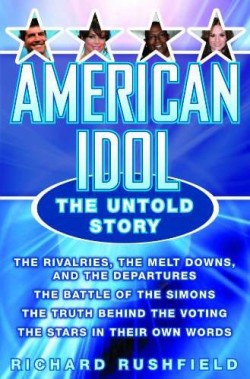
My most recent book, a history of American Idol was sold as American Idol: The Last Empire but then it was changed during the pub process to American Idol: The Untold Story. The change was instigated by the publisher on the thinking that The Last Empire was vague and didn’t tell you much of what the book would be about. That we needed something both sexier and more specific. I couldn’t really argue since this book was intended for a very broad audience and in any event, while I liked The Last Empire, I wasn’t deeply wedded to it. My agent was involved, but since I wasn’t really arguing that we needed to keep my original title it never came to looking up what was in the contract. There were extensive discussions and back and forth involving my editor, my agent and the marketing team. Lots of titles were suggested. I can’t recall what they were and in the end, I really don’t even remember who came up with Untold Story. I didn’t fall in love with it, but it seemed to most clearly encapsulate what this book was and why people should by a book about a TV show that they had been reading tons about for a decade already.
The pushback was more over the subtitle and that got very intense. The marketing folks wanted a more sensational version that emphasized the fights and conflict. I wanted one that highlighted the grandeur and aspirational aspects. I was probably afraid to sound too tawdry and the marketing people were probably right, so its an example of sometimes you can cling a little too hard to your work.
Don’t give up searching for the right title. When you find the perfect title, the entire project seems to just fall in line beneath it. Sometimes you can’t. Sometimes it’s press time and you’ve just never come up with on that just feels like it encapsulates everything you want to say in four words. But keep trying as long as you can because when you get the title right, it’s a better feeling than finishing a book.
Richard Rushfield has written books about American Idol and his college dorm and attempts to keep up a Tumblr.
Next: Urban Waite on the frustrations of hunting for a new title..
Urban Waite
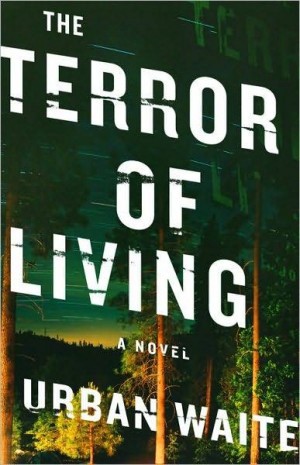
People have said, “That is one bad-ass title!” while talking about my novel, The Terror of Living. While others have complained, “The title is the only thing I didn’t like about the book.” Both, I suppose are compliments in their own ways. And both opinions fairly warranted. The truth about the title, The Terror of Living, is that I like it, I don’t love it. Sometimes I think it’s over the top, too bold, too much. Just another blown-out title to put up on the shelves next to other blown-out titles, but then I think about why I chose it and why it has stuck. The term, “The Terror of Living,” comes from listening to a story about dying young from a terminal disease. For me it’s a title about the inevitability of death, and the fears that ride along through life with us. It’s a big title, I’ll admit that freely, but when it came down to picking something I thought could bridge the gap between literary and thriller, as the reviews have pointed out, it seemed to me the perfect fit.
For about a month the publisher, with my help, floated new and different titles around. I don’t know exactly who decided to start through on the process of re-thinking the title, whether it was marketing or editorial, what I do know is that every quarter or so there is a title meeting, in which both sides sit down to discuss the upcoming releases. Terror didn’t make it out of the meeting without a few holdups. It was too big, or too genre specific, or wouldn’t play to the common reader. I’m not exactly sure. What I do know is that coming up with a title for a book you had previously thought was finished, is one of the most painful writing experiences I’ve ever had to go through. There are a lot of dead ends, a lot of titles that have already been done. I remember searching through Amazon’s online database, thinking the whole time: “This is the one!” Only to find out my current favorite had been a book three years before, and somehow became a movie I didn’t even know existed.
There are a lot of suggestions that fall on deaf ears and butt up against the various frustrations of the task. Normally serious, straightforward titles take on a tinge of sarcastic fury; for example, Into a Darkening Forest becomes: “I’ll give you something dark to…” I won’t go on here, but you see where it was going. Where, strangely, in the mood of the time, most of them did. Simple, one-word titles became the payoffs to jokes. The title, The Pass, loved by some, made others of us cringe, causing a string of sayings such as: “I’d like to pass on that title,” or “As long as you never bring up that title again, I’ll give you a pass.”
You wake up in the morning with a list of fifty titles next to your bed, and go to sleep with every one of them crossed off, while trying to think up the next day’s list. It becomes a process. It goes on for a month, this daily grind of panning for a title, hoping against all odds for just a small piece of gold. In the end, we went with The Terror of Living. There are people who love this title, and in the end they won through. Still, I can’t help but laugh every morning when I stumble out of bed, zombie-like toward the coffee, with my wife commenting, “It’s The Terror of Writing.”
Urban Waite’s novel, The Terror of Living, is the love child of Anton Chigurh and Hannibal Lecter, and has been picked by Stephen King (in Entertainment Weekly) as the final, knock your socks off, best read of the summer.
Matthew Gallaway is the author of The Metropolis Case which for all but a few agonizing months during the writing, editing, and production of the novel was called The Metropolis Case. (The Metropolis Song and Vec Metropolis were both considered and thankfully rejected.) The next installment of Publishing School will be on “author events,” so if you’re an author (or publicist!) who would like to throw in your two cents, feel free to get in touch at at mattgallaway [AT] gmail [DOT] com.
Top photo from Flickr by mpclemens.
Radiohead, "Staircase"
“And no, you’re not seeing double. The doppelganger drummers are myself and Clive Deamer. Clive has long been one of my favourite drummers and so I was really excited when he agreed to perform with us.”
— Radiohead’s Phil Selway on recruiting Clive Deamer — who has played with Portishead, Dr. John, Robert Plant and Hawkwind! — to be the Jaimoe Johanson to his Butch Trucks. Or is it the other way around?
